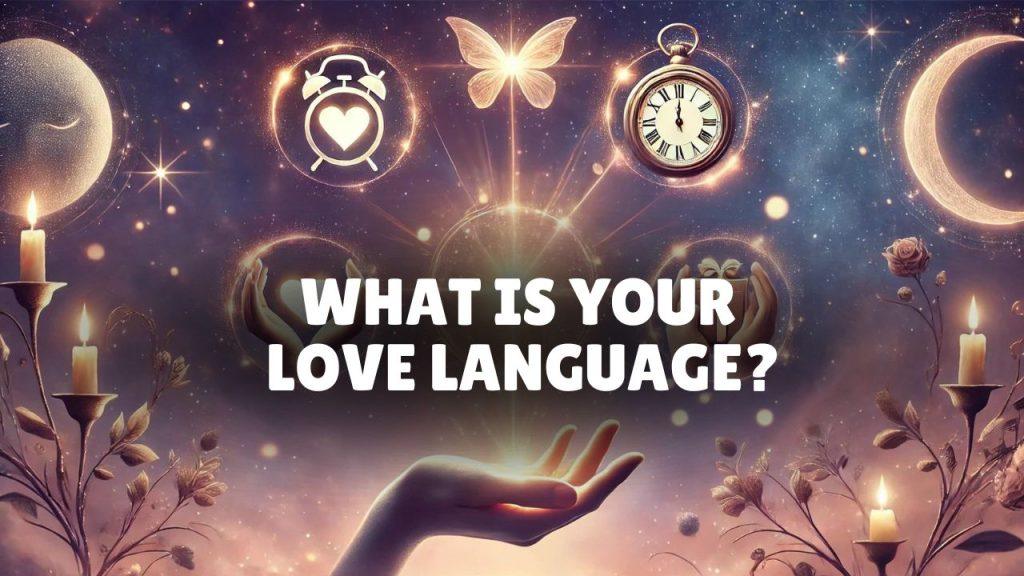Love is expressed and received in many different ways, and understanding how you or your partner express love can make a world of difference in your relationship. According to Dr. Gary Chapman, there are five main love languages that people use to show affection. Whether it’s through words, quality time, gifts, acts of service, or physical touch, everyone has their preferred way of giving and receiving love.
By knowing your love language, you can strengthen your relationships and better communicate with those around you. Take this simple quiz to find out what your primary love language is and how you can deepen your emotional connection. Whether you’re in a romantic relationship, a friendship, or just want to understand yourself better, discovering your love language can open up new doors to meaningful communication.

What is Your Love Language?
Answer the questions and find out which love language speaks to you!
Each person has a primary love language, but they may also experience love in the other languages as well. These love languages are Words of Affirmation, Quality Time, Receiving Gifts, Acts of Service, and Physical Touch. By understanding these, you can express love in the way that resonates most with your partner or loved one, ultimately creating stronger, more fulfilling connections.
Words of Affirmation
This love language is all about verbal expressions of love and appreciation. For people whose primary love language is words of affirmation, compliments, and kind, encouraging words make them feel cherished. These individuals thrive on hearing positive remarks, whether it’s a simple “I love you” or a heartfelt compliment. Negative or hurtful words, on the other hand, can deeply wound them, as words hold great power in their lives.
Examples:
- Regularly saying “I love you” and meaning it.
- Giving compliments like “You look amazing today!” or “I’m proud of you.”
- Writing heartfelt notes or texts to show affection.
- Offering words of encouragement when they’re going through tough times.
What to Avoid:
- Criticism or harsh words can be incredibly hurtful for these individuals.
- A lack of verbal appreciation can make them feel unloved or undervalued.
For those who speak this love language, the key to maintaining a strong relationship is through thoughtful and sincere verbal expressions. Words hold immense meaning for them, and positive, loving affirmations are essential to keeping the relationship emotionally satisfying.
Quality Time
Quality time is the love language of togetherness and undivided attention. For people who resonate with this love language, spending meaningful time with their loved ones is the ultimate expression of love. This isn’t just about being in the same room, but being fully present, engaging in conversations, and making eye contact. Distractions such as phones, TV, or work can feel like barriers to connection for those who value quality time.
Examples:
- Going for walks together without distractions.
- Planning date nights or special outings where you can connect on a deeper level.
- Turning off the TV or putting away phones to have meaningful conversations.
- Creating memories through shared hobbies or activities.
What to Avoid:
- Cancelling plans or constantly being distracted during time together can make them feel neglected.
- Multitasking or not paying attention to what they’re saying during conversations can create emotional distance.
Those who value quality time feel most loved when they’re given someone’s full attention. By prioritizing time spent together, free from distractions, you can nurture a stronger emotional connection and build trust in your relationship.
Receiving Gifts
For some, love is most clearly expressed through thoughtful gifts. However, this love language isn’t about materialism—it’s about the meaning and effort behind the gift. People who speak the language of receiving gifts feel appreciated when they receive a present, no matter how small, that shows their loved one was thinking of them. It’s the gesture behind the gift that counts, not the price tag.
Examples:
- Surprising them with their favorite snack or a thoughtful token.
- Giving a gift on a special occasion, like their birthday or an anniversary.
- Bringing back something from a trip that reminds you of them.
- Handmade gifts, like a photo album or a personalized card, can hold great meaning.
What to Avoid:
- Forgetting important dates like birthdays or anniversaries.
- Giving thoughtless or generic gifts that don’t reflect personal effort.
Receiving gifts is all about thoughtfulness and making someone feel special. For these individuals, gifts serve as a physical reminder that they are loved and cherished, and forgetting to give meaningful gifts can make them feel unappreciated.
Acts of Service
Acts of service are all about actions speaking louder than words. People with this love language feel loved when someone goes out of their way to make their life easier. This could be anything from cooking dinner, helping with household chores, or running errands. It’s the act of taking on tasks to alleviate stress or burden that makes them feel appreciated.
Examples:
- Helping them with housework or taking care of a task they’ve been putting off.
- Cooking their favorite meal after a long day.
- Offering to pick up groceries or run an errand for them.
- Doing something you know will make their life a little easier.
What to Avoid:
- Being unreliable or failing to follow through on promises.
- Neglecting to help when they’re clearly overwhelmed or stressed.
For those who value acts of service, the most meaningful gestures come from the practical help and support they receive. They feel cared for when their partner makes life a little easier by doing something that matters to them.
Physical Touch
Physical touch is a powerful love language that conveys love and connection through physical contact. For those whose primary love language is physical touch, gestures like holding hands, hugging, or cuddling are essential. Physical closeness provides them with reassurance and comfort, making them feel emotionally connected and secure in the relationship.
Examples:
- Hugging or holding hands while walking.
- Sitting close together on the couch during a movie.
- Offering a back rub after a long day.
- A kiss or gentle touch as a way of expressing affection.
What to Avoid:
- A lack of physical affection can make these individuals feel distant or unloved.
- Withholding touch during emotional moments can lead to feelings of isolation.
For people who prioritize physical touch, being physically close to their loved ones is key to feeling connected. A lack of affectionate gestures can create emotional distance, but regular, gentle touches can strengthen the bond and provide a sense of security.
Understanding and recognizing your own love language—and the love languages of those around you—can significantly improve your relationships. Whether you express love through words, time, gifts, service, or touch, knowing how to communicate in a way that resonates with others helps build trust, deepen emotional bonds, and create a stronger foundation for any relationship. By learning to speak each other’s love languages, you open the door to more meaningful connections and a lasting sense of fulfillment in your relationships.
